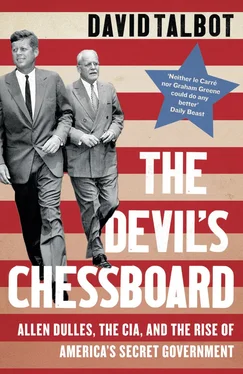Intelligence reports do not normally make for entertaining reading. Few station chiefs come close to having the literary touch of onetime spies like Graham Greene, David Cornwell (John le Carré), or Ian Fleming. But, following his release from U.S. military detention in 1947, Eugen Dollmann’s espionage career became such a flamboyant mess that he inspired some of the most colorful memoranda ever produced by the U.S. intelligence bureaucracy. Reading through these declassified CIA documents fills one with awe for Dollmann’s endless powers of reinvention, and a sense of wonder as to why men as knowing as Dulles and Angleton ever saw him as spy material.
U.S. surveillance of Dollmann begangetting interesting in 1951, when he was located in a suite at the posh Hotel Paradiso, overlooking Lake Lugano in Switzerland, near northern Italy. By then, the colonel’s high life was beginning to catch up with him. He was reported to be in financial distress and looking for ways to make some quick cash. Among the schemes he was pondering was writing his memoirs—which he was promising would be dishy—and hustling various Nazi documents he claimed were authentic, including some supposedly written by Hitler. The colonel was shaking down the CIA for 200,000 lire in return for the “exclusive” rights to examine the documents.
Dulles and the CIA knew that there was great potential for embarrassment with Dollmann. As the years passed, the agency’s memos on the colorful SS veteran revealed rising levels of anxiety and exasperation.
In November 1951, Dollmann was reported to be in “close contact” with Donald Jones, which was an intriguing twist, since Jones was the OSS daredevil whom Dulles had asked to rescue Karl Wolff from the Italian partisans during the war. Jones was “still presumed to be an agent of U.S. intelligence,” but the memo made clear that Dollmann’s contact with him was not strictly professional. “The two are now divided because of a quarrel, presumed to have originated over a question of money, or perhaps jealousy, since both are suspected of being sexual perverts.” The memo concluded that Dollmann’s value as “an agent or informer” was “uncertain … he is not the man he was in 1940–45.”
Dollmann, no doubt, would have readily agreed. For one thing, he had less money. And he was stuck in purgatory in Switzerland rather than enjoying the sweet life in his beloved Italy because U.S. agents had warned him they still could not guarantee his safety there.
Nonetheless, Dollmann would soon find himself in Italy—at least briefly—after he outstayed his welcome in Switzerland. According to a U.S. intelligence report, Dollmann was expelled from Switzerland in February 1952 after he was caught having sex with a Swiss police official. In desperation, Dollmann appealed to his old fascist friends in the Italian church, and he was spirited across the border and given temporary sanctuary at a Franciscan monastery in Milan. Dollmann’s savior this time, Father Enrico Zucca, was famous for his role in raising Mussolini’s body from the grave on Easter 1946 in preparation for the day when Il Duce would be reburied with full honors on Rome’s Capitoline Hill. The abbot had less spectacular plans for Dollmann. He slipped a monk’s habit on him and smuggled him onto a boat in Genoa, from where Dollmann was shipped to General Franco’s fascist paradise in Spain.
In Madrid, Dollmann came under the protection of former Nazi commando leader Otto Skorzeny, who had put together a wide-ranging racket, trading in arms and helping SS fugitives flee justice. Skorzeny was joined for a time in Spain by Hjalmar Schacht, who had been acquitted at Nuremberg and would parlay his reputation as Hitler’s banker into a postwar career as an international financial consultant. Schacht knew where much of the wealth plundered from Europe by German corporations and Nazi officials had been hidden, and Skorzeny used this inside knowledge to help finance his SS ratlines. Angleton also found Skorzeny’s services useful, and he kept in regular touch with the entrepreneurial ex-Nazi.
Dollmann undertook errands for Skorzeny’s international neo-Nazi circuit. But Dollmann was no good at the freelance espionage game. In October 1952, he flew to Germany on some sort of political mission to make contact with German youth groups. His plans were betrayed and he was arrested at the airport as soon as he landed. The authorities accused him of traveling on a false passport, and he didn’t bother denying it. Even in his native Germany, Dollmann was a man without a country. No government wanted to claim him—at least not openly.
A November 1952 CIA memo reported that Dollmann was back in Rome. He started haunting his favorite cinemas again, but this time it nearly proved fatal when “he was noticed by certain Communist elements” in the theater and had to be “rescued by the police from a threatening mob.”
Still desperate for cash in Rome, Dollmann again tried his hand at selling Hitler documents that he insisted were genuine. This time he was dangling an Operation Sunrise angle that Dulles certainly found compelling. Among the papers in his possession, Dollmann swore, was a letter from Hitler to Stalin proposing a separate peace between Germany and Russia. Such a letter would have put Dulles’s own Operation Sunrise deal in a much better light. If Hitler and Stalin really did discuss their own pact near the end of the war, it made Dulles look like a brilliant chess player instead of an insubordinate troublemaker. Dulles’s friends at Life magazine let it be known that they would pay a staggering $1 million for such a letter. But Dollmann apparently never produced it.
Dollmann’s moneymaking schemes grew more frantic. In December 1952, he quietly reached out to Charles Siragusa, a federal narcotics agent in the U.S. embassy in Rome with close ties to the CIA. Siragusa had proved veryuseful to Angleton over the years, as a bagman for political payoffs and as a link to the criminal underworld when the agency required the Mafia’s services. Dollmann had his own interesting offer for Siragusa. He proposed becoming a paid informant for the narcotics agent and infiltrating the neo-Nazi movement in Vienna, which he claimed was financing its activities by dealing cocaine.
Dollmann’s offer smacked of desperation, but, in fact, he was already spying on other ex-Nazi colleagues for the CIA. At the same time, in true Dollmann fashion, he was also hiring himself out to these neo-Nazi groups and reporting back to them about U.S. intelligence activities. As if this web of competing loyalties was not complicated enough, while Dollmann was living in Madrid by the grace of the Franco government, he was also working as a British spy.
By 1952, CIA station chiefs in Europe had grown deeply leery of Dollmann. That spring, an agency memo circulating among the field stations in Germany, Italy, and Spain warned “against [the operational] use of Dollmann … because he had already been involved with several intelligence organizations in Western Europe since 1945; his reputation for blackmail, subterfuge and double-dealing is infamous; [and] he is homosexual.” At one point, CIA officials even raised the possibility that Dollmann had sold himself to Moscow and was a Soviet double agent.
But it was not until 1955 that the CIA finally severed its ties to Dollmann. It took one last brazen blackmail attempt to persuade Dulles that he had to cut the cord. Dollmann had finished his memoirs that year, and, as promised, the book was rife with salacious details, including unflattering observations about Dulles and Angleton. Before the book went to the printers, Dollmann sent a message to Dulles through the U.S. consulate in Munich, letting it be known that he was eager “not to offend [my] great good friend” Dulles, and politely asking the CIA director to flag anything he found objectionable in the excerpts mailed to him. The implication was clear: They were men of the world who understood each other. They could certainly work out an appropriate arrangement.
Читать дальше











